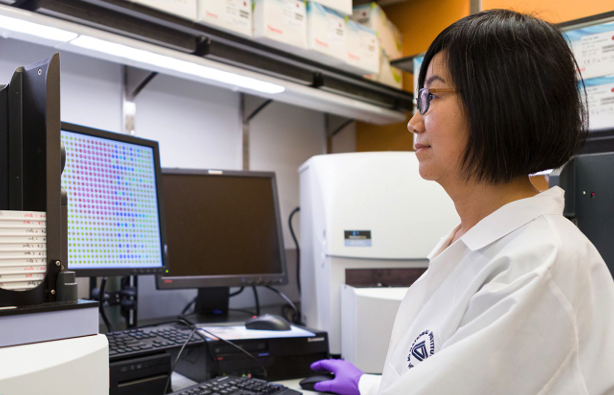Goal 4: Leverage Crosscutting Strategies to Enhance Translational Science
Translational science faces challenges and opportunities in several areas that cross other strategic plan goals and serve as the foundation used to achieve other objectives. NCATS will continue to leverage cross-cutting approaches to enhance the work bringing more treatments to all people more quickly. Promoting team science will bring together different types of expertise to tackle complex problems. Initiating strategic partnerships will extend our reach and resources. Embracing data science and facilitating FAIR data will unlock new insights and accelerate discoveries. Finally, our commitment to education and outreach ensures that we are continuously learning, growing, and engaging with the communities we serve.
Objective 4-1: Support and promote team science.
As a principle of translational science, team science brings together individuals with different areas of expertise across professions and different backgrounds to work on a shared problem and produce research that advances translation. Team science is a core part of NCATS’ culture that has enabled highly collaborative efforts, such as the RDCRN, National Clinical Cohort Collaborative (N3C), Tissue Chip for Drug Screening Program, Biomedical Data Translator, Accelerating Medicines Partnership® (AMP®) Bespoke Gene Therapy Consortium (BGTC), and the Platform Vector Gene Therapy (PaVe-GT) program, to name a few. Team science also provides a fertile ground for enhancing training and mentorship opportunities. We will promote these opportunities through training and career development activities at NCATS and partner institutions, such as those funded through the CTSA Program.
We will continue to foster collaborative opportunities that bring people with different areas of expertise and backgrounds together to successfully address translational roadblocks. For example, successful clinical trials require a range of roles such as nurses, pharmacists, coordinators, project managers, statisticians, community workers, in addition to patient and community perspectives. Cross-disciplinary teams and partnerships leverage all partners’ expertise to solve complex translational science problems as expanded on in Objective 4-2. Hiring from or engaging with our communities and incorporating their input is also needed to further the field of translational science and, more importantly, ensure the results can benefit all.
Objective 4-2: Develop effective partnerships and collaborations.
Without partnerships and collaboration, research can be stifled and siloed, slowing translation and resulting in missed opportunities. We can break down siloes in translation through innovative and strategic collaborations with partners across the biomedical ecosystem.
We will continue to develop effective partnerships and collaborations through numerous channels, including formal strategic alliances, research agreements, and other types of partnerships. Collaborating with patients, caregivers/care partners, patient advocates, advocacy and professional nonprofit groups, communities, academia, industry, and other federal agencies will offer broad perspectives to advance translational science, find efficiencies, and ultimately benefit patients.
For example, NCATS led the ACTIV-6 decentralized platform clinical trial, which involved numerous partners and leveraged the CTSA Program infrastructure and collaborations to enroll participants from all 50 states and territories. Enrollment of hard-to-reach groups increased steadily over time. The study completed enrollment with unprecedented speed: Each arm completed enrollment in less than 10 months, and results were posted within 15 months from day one of a given treatment opening for participant enrollment. As a result, clinically relevant information reached doctors and patients more quickly than traditional methods. We will learn from and expand on this success.
Objective 4-3: Promote data science strategies and standards.
While specific aspects of data science will directly speed translation (see Objective 3-2), more broadly, a variety of data science approaches underlie and cut across much of NCATS’ work. Improving and promoting strategies in data science that facilitate knowledge generation is a key objective of the next five years.
Six core themes in data science will serve as a roadmap and drive the approaches we utilize and support: (1) data stewardship and sustainability; (2) data ingestion, management, and governance; (3) new technologies for expanded knowledge; (4) data reuse and interpretation; (5) open science and a collaborative culture; and (6) data science capacity building and workforce development. The privacy of individuals, their control and ownership of their data, and the security of that data will always be a top priority in our data science efforts. To support growing interest in AI/ML for research, NCATS will apply and foster the development of standardized practices and data formats to ensure that data sets are valuable and predictive, all with the overarching goal of ensuring good quality data sets, analytic methods, and the interpretation and use of results. We will use state-of-the art AI technology (including large language models), biostatistics, informatics, and newer efforts in quantum science to aid in every step of the translational process. Specific areas include the innovative design of preclinical and clinical studies and preventative care strategies.
Objective 4-4: Raise awareness of the value and applications of translational science and its principles.
Translational science is an engine that drives scientific research to clinical practice, yet it is not well understood by those outside the field. More awareness of translational science is needed to convey its value in addressing long-standing research challenges.
We will enhance translational science efforts by creating and sharing resources, methodologies, and impact stories. We will increase knowledge about translational science through scientific publications, as well as other communication and outreach activities intended to reach audiences beyond the research community. We also will build relationships through different types of engagement. We welcome every opportunity to inform research communities and the public about how our research and support addresses long-standing challenges in translational research so that new treatments and other health solutions reach all people more quickly.



